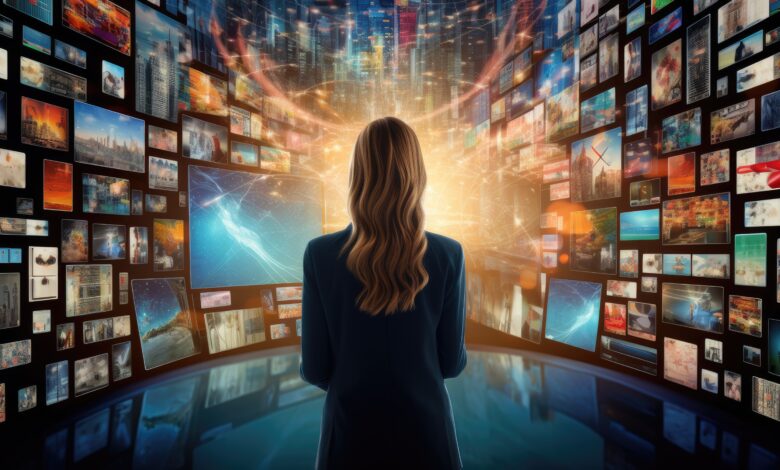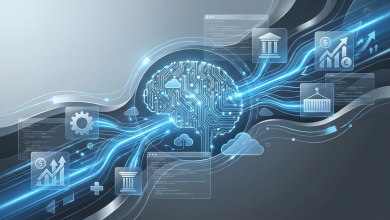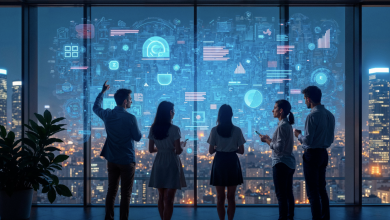
The invention of the printing press by Johannes Gutenberg in the mid-15th century was a watershed moment fundamentally transforming society via the mass production of books and the wide dissemination of knowledge, breaking the monopoly of the elite over knowledge and education. It played a crucial role in sparking the Age of Enlightenment, a period characterized by an explosion of scientific discovery and intellectual fervor that laid the groundwork for the modern democratic state.
Fast forward to the present day, and we are witnessing a parallel revolution in the form of generative AI. This technology is revolutionizing the way we approach work, creativity, and inclusion. Just as the printing press made information accessible to a wider audience, generative AI is breaking down barriers to creative expression and information sharing.
The integration of Artificial Intelligence (AI) in content creation is not just a trend but a transformative force reshaping the landscape of creativity, amplifying diverse voices, and fostering a more inclusive digital era.
The business landscape
The transformative power of generative AI extends well beyond basic content generation, fundamentally altering how businesses of all sizes compete and innovate. For small and medium-sized enterprises (SMEs), this technological evolution levels the playing field, enabling them to rival larger corporations in the quality and efficiency of their marketing efforts. Chat-based tools provide SMEs with the ability to produce high-quality written content that resonates with their audience, effectively mimicking human writing styles. This not only enhances their marketing strategies but also significantly reduces the costs associated with content creation.
Moreover, the impact of AI-driven design tools further democratizes the ability to produce visually compelling content. These tools empower businesses without extensive design resources to create professional-grade visuals, from social media graphics to marketing brochures, with simplicity and speed. The significance of this cannot be overstated, as visual branding and marketing materials play a critical role in a business’s ability to attract and retain customers.
The broader implications of this democratization are significant. By reducing the barriers to high-quality content creation, generative AI encourages a more dynamic business environment where innovation and creativity are the primary drivers of success, rather than budget size. This shift not only spurs competition but also fosters a more diverse marketplace, where businesses can differentiate themselves through the uniqueness and relevance of their content.
The advent of AI in content creation also opens up new possibilities for customization. AI algorithms can analyze consumer data to produce tailored content that speaks directly to the interests and needs of individual customers, enhancing engagement and loyalty. This level of customization was once a resource-intensive strategy, but with AI, businesses can now automate and scale marketing efforts with unprecedented efficiency.
Additionally, generative AI is not only transforming how content is created but also how it is optimized for search engines. SEO strategies can be enhanced with AI tools that analyze keyword trends, competitor content, and search engine algorithms to suggest content optimizations, making it easier for SMEs to improve their online visibility and attract organic traffic.
Creative industries’ new dawn
The democratization effect of AI on the creative sectors is profoundly reshaping the arts and entertainment industries. Beyond the realms of video editing and music composition, AI is extending its reach into areas such as writing, painting, and digital art creation, further lowering the barriers to content production across the spectrum of creativity.
AI’s impact is particularly notable in the realm of digital art, where platforms allow users to create complex images and artworks based on textual prompts or genetic algorithms, opening the door for those without formal training in art to participate in visual creativity. Similarly, in the literary world, AI tools are being developed to assist with plot generation, character development, and even poetry, making the art of storytelling more accessible to those who may have been intimidated by the blank page.
These technologies are fostering unprecedented levels of collaboration, not only between humans and machines but also among creators worldwide. AI-driven platforms can serve as the nexus for global creative projects, enabling artists, musicians, and writers to merge their talents in ways that were previously logistically challenging. This collaborative potential is particularly exciting for cross-disciplinary projects, where, for example, musicians, visual artists, and technologists can come together to create immersive experiences that blend art forms in innovative ways.
Revolutionizing education
In the realm of education, AI’s capabilities are creating more opportunities for personalized learning experiences, and making educational content more broadly accessible. Educational platforms can use AI to adapt content to the learner’s pace, ensuring concepts are mastered before advancing. This personalization is key in addressing the diverse needs of students, accommodating different learning styles, and overcoming traditional educational barriers.
Furthermore, AI’s ability to translate educational materials into various languages and adapt content for different learning abilities makes education truly inclusive. Tools using AI-powered language learning platforms provide accessible, personalized language education, underscoring AI’s role in bridging educational gaps across the globe.
Ethical considerations and the path forward
The democratization of content creation through AI, while laden with benefits, also necessitates a careful consideration of ethics. The potential for perpetuating biases, spreading misinformation, and infringing on copyright are real challenges that call for responsible AI use. Initiatives aimed at increasing transparency in AI operations and efforts to de-bias AI models are critical steps towards ensuring that AI serves as a force for good.
The development of digital literacy programs and ethical guidelines for AI-generated content is essential for ensuring the safe and fair use of this form of technology. These measures can help ensure that the democratization of content does not come at the cost of truth, fairness, or creative integrity. As we embrace AI’s potential to transform content creation, the emphasis must be on fostering an ecosystem that values ethical considerations, promotes inclusivity, and ensures that the benefits of AI are accessible to all.
AI’s role in democratizing content creation marks a significant shift towards a more inclusive, diverse, and creative digital landscape. By enabling businesses to compete on a level playing field, transforming educational access and personalization, and empowering creative expression across boundaries, AI is reshaping our digital interactions.
However, this new era of content creation also brings to the forefront the importance of navigating the ethical implications of AI with caution and responsibility. As we move forward, the development and deployment of AI in content creation must be guided by principles that uphold the values of inclusivity, fairness, and creativity, ensuring a future where the democratization of content benefits everyone.




